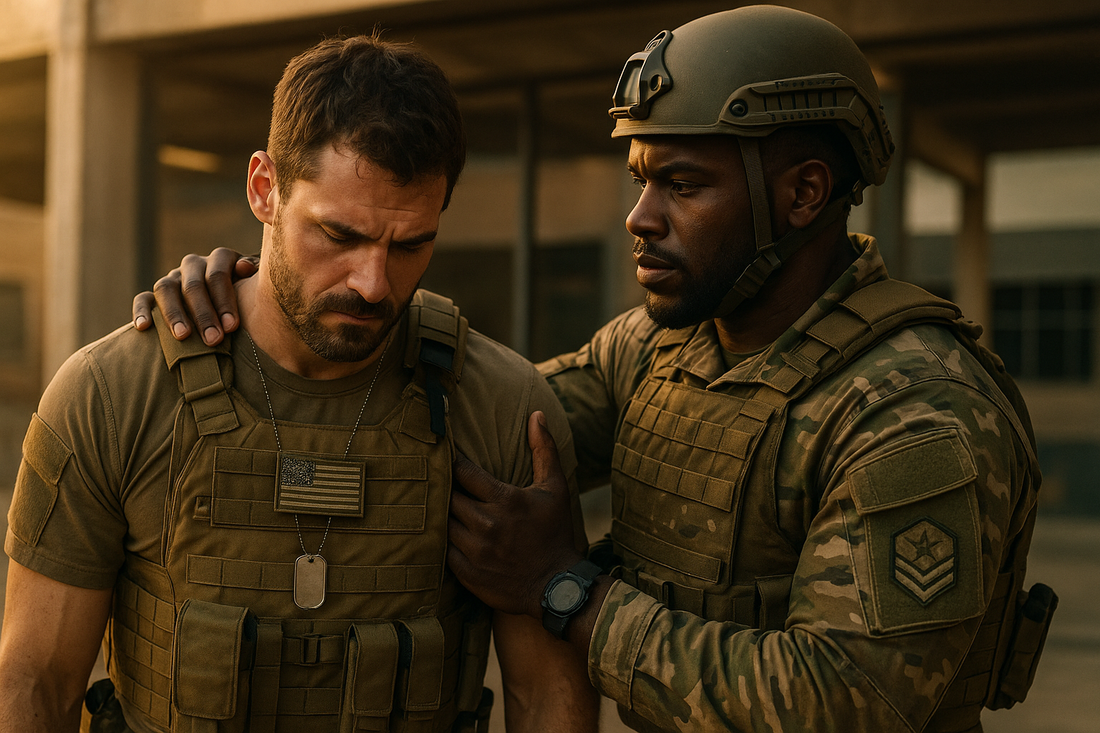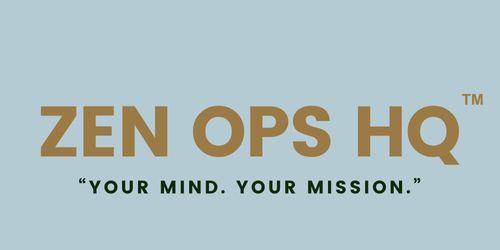
PTSD to Post-Traumatic Growth: Rewriting the Warrior's Story
Every warrior carries stories – some of triumph, some of loss, and some of wounds that run deeper than flesh. At Zen Ops HQ™, we understand that Post-Traumatic Stress Disorder (PTSD) isn't the end of a warrior's story – it's often the beginning of their most important chapter. Through the transformative journey from PTSD to Post-Traumatic Growth (PTG), warriors can rewrite their narrative from victim to victor, from wounded to healer, from surviving to thriving.
Understanding PTSD: The Warrior's Invisible Wound
PTSD affects millions of veterans, first responders, and caregivers who have witnessed or experienced traumatic events. Unlike physical wounds that heal with time, PTSD can persist and even worsen without proper understanding and treatment.
Common PTSD symptoms that warriors experience include:
- Intrusive Memories: Flashbacks, nightmares, and unwanted thoughts about traumatic events
- Avoidance: Staying away from places, people, or situations that trigger memories
- Hypervigilance: Constant alertness and exaggerated startle responses
- Emotional Numbing: Difficulty feeling positive emotions or connecting with others
- Sleep Disturbances: Insomnia, night terrors, or restless sleep
- Survivor's Guilt: Questioning why you survived when others didn't
At Zen Ops HQ™, we recognize that these symptoms aren't signs of weakness – they're normal responses to abnormal situations that warriors face in service to others.
The Paradigm Shift: From Disorder to Growth
Traditional approaches often focus solely on managing PTSD symptoms, but the revolutionary concept of Post-Traumatic Growth offers a different path. Developed by psychologists Richard Tedeschi and Lawrence Calhoun, PTG recognizes that trauma can actually catalyze profound positive change and personal development.
Post-Traumatic Growth manifests in five key areas:
- Appreciation of Life: A deeper gratitude for everyday experiences and relationships
- Relating to Others: Stronger, more meaningful connections with fellow warriors and loved ones
- Personal Strength: Recognition of your own resilience and capability
- New Possibilities: Openness to new opportunities and life directions
- Spiritual Development: Deeper connection to purpose, meaning, and something greater than yourself
The Warrior's Journey: From Trauma to Transformation
Mariliz Berrios, founder of Yes Universe LLC and Zen Ops HQ™, understands this journey intimately. As a Neuro-Spiritual Coach who has personally navigated trauma and transformation, she brings both professional expertise and lived experience to supporting warriors on their path to Post-Traumatic Growth.
Her approach recognizes that warriors possess unique strengths that can accelerate the growth process:
- Resilience Training: Military and first responder training builds mental toughness
- Mission Focus: Warriors understand the power of purpose-driven action
- Brotherhood/Sisterhood: The warrior community provides unparalleled support
- Service Orientation: The desire to help others can fuel personal healing
- Adaptability: Warriors are trained to overcome obstacles and adapt to challenges
The Valkyrie Path: Ancient Wisdom for Modern Healing
The Norse Valkyries understood that warriors who faced their greatest battles – and survived – were worthy of the highest honor. In Norse mythology, these divine warrior maidens didn't just collect the fallen; they recognized that surviving trauma was itself a form of victory deserving celebration.
Your journey through PTSD to Post-Traumatic Growth follows the Valkyrie path:
- Recognition: Acknowledging your trauma and its impact
- Honor: Respecting your survival and resilience
- Transformation: Using your experience to become stronger and wiser
- Service: Helping other warriors navigate their own journeys
- Legacy: Creating meaning from your experiences that benefits others
The Five Stages of Warrior Post-Traumatic Growth
Stage 1: Acknowledgment - Facing the Battle Within
The first step toward Post-Traumatic Growth is acknowledging that trauma has occurred and that it has changed you. This isn't about dwelling on the past – it's about honest assessment of where you are now.
Warrior Action Steps:
- Complete a trauma inventory with a qualified professional
- Identify specific symptoms and their impact on your life
- Recognize that seeking help is a tactical decision, not weakness
- Connect with other warriors who understand your experience
Stage 2: Processing - Making Sense of the Experience
Warriors are natural problem-solvers. This stage involves applying that analytical mindset to understanding your trauma and its effects on your life, relationships, and worldview.
Warrior Action Steps:
- Work with trauma-informed therapists who understand warrior culture
- Engage in evidence-based treatments like EMDR, CPT, or PE therapy
- Practice mindfulness and meditation adapted for warrior minds
- Use journaling to process thoughts and emotions
Stage 3: Integration - Incorporating New Understanding
This stage involves integrating your new understanding of trauma and its effects into a coherent narrative about who you are and what your experiences mean.
Warrior Action Steps:
- Develop a personal mission statement that includes your trauma experience
- Identify how your challenges have made you stronger or wiser
- Practice self-compassion and forgiveness
- Begin sharing your story with trusted allies
Stage 4: Reconstruction - Building Your New Identity
Warriors who reach this stage begin constructing a new identity that incorporates both their trauma and their growth. You're not the same person you were before, and that's not necessarily a bad thing.
Warrior Action Steps:
- Set new goals that align with your evolved values and priorities
- Develop new skills or pursue education that supports your growth
- Strengthen relationships with people who support your new identity
- Explore new ways to serve that honor your experience
Stage 5: Contribution - Serving from Strength
The final stage of Post-Traumatic Growth involves using your experience and wisdom to help others. This service-oriented approach transforms your pain into purpose and your struggles into strength that benefits the warrior community.
Warrior Action Steps:
- Mentor other warriors beginning their healing journey
- Volunteer with organizations that support veteran and first responder wellness
- Share your story publicly to reduce stigma and inspire others
- Develop programs or resources that help other warriors
The Neuroscience of Post-Traumatic Growth
Modern neuroscience validates what ancient warriors intuitively knew – the brain's remarkable ability to heal and grow stronger after trauma. This process, called neuroplasticity, allows warriors to literally rewire their brains for resilience and growth.
Key neurological changes that support Post-Traumatic Growth include:
- Prefrontal Cortex Strengthening: Enhanced decision-making and emotional regulation
- Hippocampus Recovery: Improved memory processing and integration
- Default Mode Network Changes: Reduced rumination and increased present-moment awareness
- Stress Response Regulation: Better management of fight-or-flight responses
Supporting Your Growth: The Warrior's Toolkit
Post-Traumatic Growth doesn't happen automatically – it requires intentional effort and the right support. At Zen Ops HQ™, we provide warriors with tools specifically designed to support this transformative journey:
Nutritional Support for Brain Health
Trauma affects brain chemistry, and proper nutrition can support healing and growth. Key nutrients for Post-Traumatic Growth include:
- Omega-3 Fatty Acids: Support brain health and reduce inflammation
- Magnesium: Calms the nervous system and improves sleep
- B-Complex Vitamins: Support neurotransmitter production and energy
- Adaptogenic Herbs: Help the body adapt to and recover from stress
Mind-Body Practices
Integrating physical and mental practices accelerates Post-Traumatic Growth:
- Yoga and Tai Chi: Combine movement, breath, and mindfulness
- Martial Arts: Channel warrior energy into disciplined practice
- Breathwork: Regulate the nervous system and process emotions
- Nature Therapy: Connect with the healing power of the natural world
Breaking Through Barriers: Common Obstacles to Growth
Warriors often face unique barriers to Post-Traumatic Growth:
- Stigma: Fear of being seen as weak or broken
- Identity Confusion: Uncertainty about who you are beyond your trauma
- Survivor's Guilt: Feeling unworthy of healing when others didn't survive
- Hypervigilance: Difficulty relaxing enough to process emotions
- Isolation: Withdrawing from support systems
Recognizing these barriers is the first step to overcoming them. Remember: seeking growth isn't betraying your fallen comrades – it's honoring them by living fully.
The Warrior's New Mission: From Wounded to Healer
Post-Traumatic Growth often leads warriors to a new mission – helping others navigate their own healing journeys. This transformation from wounded warrior to healer represents the ultimate victory over trauma.
Ways warriors can serve from their strength include:
- Peer Support: Providing guidance to fellow warriors
- Advocacy: Fighting for better resources and understanding
- Education: Teaching others about trauma and recovery
- Innovation: Developing new approaches to warrior wellness
- Leadership: Guiding organizations that serve the warrior community
Your Growth Story Starts Now
Your trauma doesn't define you – your response to it does. At Zen Ops HQ™, we believe every warrior has the potential for Post-Traumatic Growth, regardless of how dark their current chapter might seem.
The journey from PTSD to Post-Traumatic Growth isn't easy, but it's possible. With the right support, tools, and community, you can transform your deepest wounds into your greatest strengths.
Remember:
- Your survival is already a victory worth celebrating
- Your struggles have given you wisdom that can help others
- Your healing journey honors those who didn't make it home
- Your growth creates ripples that benefit the entire warrior community
The Valkyries understood that the greatest warriors aren't those who never fall – they're those who rise stronger after every battle. Your Post-Traumatic Growth journey is proof that you are among the greatest warriors of all.
At Zen Ops HQ™, we honor your courage in facing your inner battles and support your journey toward Post-Traumatic Growth. Your story isn't over – it's just beginning its most powerful chapter. Let us help you write it with the honor, strength, and wisdom you've earned through your service and survival.

